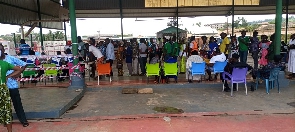Election rigging is a serious threat to democracy in Ghana, and it can have far-reaching consequences. The 2024 election in Ghana is fast approaching, and it is essential to understand the dangers of election rigging.
One of the primary dangers of election rigging is the erosion of public trust in the electoral process. When citizens believe that their votes do not count, they may become disillusioned with the democratic process. This can lead to a breakdown in the relationship between the government and the people, which can be detrimental to democracy.
Election rigging can also lead to political instability. When citizens believe that the election is rigged, they may take to the streets to protest, which can lead to violence and unrest. This can destabilize the country and make it difficult for the government to govern effectively.
In addition, election rigging can lead to the subversion of democracy. When elections are rigged, the will of the people is not reflected in the outcome. This can lead to a situation where the ruling party or government does not have the support of the majority of citizens, which can undermine the legitimacy of the government.
Election rigging can also lead to the violation of human rights and civil liberties. When elections are rigged, citizens may be denied their right to vote, and their voices may not be heard. This can lead to the violation of human rights and civil liberties, which are fundamental to democracy.
Finally, election rigging can lead to economic stagnation. When citizens lose faith in the electoral process, they may become less willing to invest in the country. This can lead to a decrease in foreign investment and a slowdown in economic growth.
In conclusion, the dangers of election rigging in Ghana 2024 are significant. It can lead to the erosion of public trust in the electoral process, political instability, the subversion of democracy, the violation of human rights and civil liberties, and economic stagnation. The government, political parties, and citizens need to work together to ensure that the election is free, fair, and transparent. Only then can Ghana continue to build a strong and vibrant democracy.
Opinions of Saturday, 16 September 2023
Columnist: Michael Agbesi Kelly
Dangers of rigging election 2024
Entertainment


















